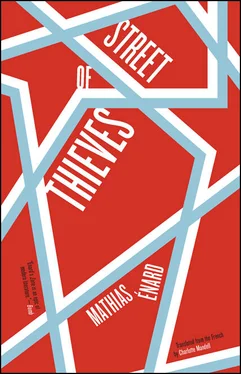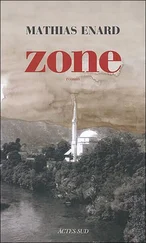He exaggerated about the French: he told me he had survived thanks to the Restos du Coeur and the Soupe Populaire, soup kitchens for the homeless, where if you stood in line long enough you ended up eating some beans or leaving with a package of pasta without anyone asking you any questions. The picture he painted of Paris was not an enticing one — battalions of poor to whom they handed out individual tents so they could sleep on the sidewalks, right in the middle of the streets; endless suburbs, abandoned by God and man, where everyone was unemployed, where there was nothing to do except burn cars to avoid boredom on the weekend — and above all, hatred, he said, the hatred and violence that you feel in that city, you have no idea. Every day on the news you hear about the rising hatred. I’m telling you, they don’t realize it, they’re headed straight for an explosion.
He added a little more than that, true, but it wasn’t reassuring. The French Right wanted to close the borders, blindfold their eyes with a tricolor flag, and be hermetically sealed against everything, except cash.
Mounir had ended up leaving Paris, disgusted, to try his luck farther south — what about Marseille, did you see Marseille? I had my memories of thrillers by Izzo and I felt as if I knew Marseille. But no, Mounir hadn’t stopped in Marseille, he had his face smashed in by two guys in front of the Montpellier train station, who had attacked him just like that, for the pleasure of it, he said. Ever since then, I never go out without a knife, he added, and it was true: he always carried a blade on him, short but sharp.
The real good fortune of Barcelona, the only thing that still made the city a city and not an ensemble of bloodthirsty ghettos, was the tourists. A blessing from God. Everyone lived off them, in one way or another. The restaurant owners lived off them, the hotel owners lived off them, the café owners and the vendors of soccer jerseys lived off them, the butchers lived off them, and even the bookstores, which had branches in museums to pump their share of this pink-skinned gold that irrigated the center of town. The beer hawkers lived off them, the peddlers of birdcalls, whistles, magic spinning tops, and blinking pins lived off them — Mounir lived off them too. After all, as he said, everyone steals from these tourists. Everyone robs them. They pay eight euros for their beers on La Rambla. I don’t see why taking a camera, a wallet, or a handbag from them is necessarily more evil. Because it’s haram, actually, it’s theft. No, he replied, if Al-Qaida allows infidels to be beheaded, I don’t see why it’s forbidden to pickpocket them, and he let out a big laugh.
The truth is that it was hard to contradict him: you sometimes felt as if it was God himself (may He forgive me) who sent these creatures into our alleyways, with their innocent airs, looking up in the sky as Mounir calmly slipped his hand into their backpacks.
Manna. The poorest survived thanks to tourism, the city survived thanks to tourism, it always wanted more, always attracted more, increased the number of hotels, of inns, of planes to bring these sheep to be fleeced, it all reminded me of Morocco, because at that period there was a promotional campaign for tourism in Marrakesh in the Barcelona subway, an assortment of orientalist photographs with a pretty slogan like “Marrakesh, the city that travels inside you,” or “Where your heart takes you,” and I said to myself that tourism was a curse, like gasoline, a trap, which brought false wealth, corruption and violence; in the Barcelona subway I thought again of the explosion in Marrakesh, of Sheikh Nureddin somewhere in Arabia, and of Bassam, somewhere in the Land of Darkness, of the attack in Tangier where that student had met death by sword — of course, Barcelona was different, it was a democracy, but you felt it was all at a tipping point, that it wouldn’t take much for the whole country to fall into violence and hatred as well, that France would follow, then Germany, and all of Europe would catch fire like the Arab world; the obscenity of this poster in the subway was proof of it, there was nothing else for Marrakesh to do than invest money in ad campaigns so that their lost manna would return, even if they knew perfectly well that it was the money from tourism that provoked underdevelopment, corruption and neo-colonialism, just as in Barcelona, little by little, you felt resentment against foreign cash mounting, cash from within as well as from without; money pitted the poor against each other, humiliation was slowly changing into hatred; everyone hated the Chinese, who were buying up the bars, restaurants, markets, one by one with the money of entire families who came from regions whose poverty couldn’t even be imagined; everyone despised the British louts who came to quench their thirst with cheap beer, fuck in doorways, and, still drunk, take a plane back that had cost them the price of a pint of ale in their obscure suburb; everyone silently desired those very young Nordic girls the color of chalk who, because of the difference in temperature, broke out their miniskirts and flip-flops in February — one quarter of Catalonia was out of work, the papers overflowed with terrifying stories about the crisis, about families kicked out of apartments they couldn’t pay for anymore, which the banks sold off cheaply while still continuing to claim their debt, about suicides, sacrifices, discouragement: you could feel the pressure mounting, violence mounting, even on the Street of Thieves among the poorest of the poor, even in Gràcia among the sons of the middle class, you could feel the city ready for anything, for resignation as well as for insurrection.
Mounir told me about Sidi Bouzid, about the gesture of despair that had set off the Revolution: you had to lift your hand against yourself to make the masses react, as if only that ultimate motion could finally set things off — someone had to burn himself to death for people to find the courage to act; it took the irreversible death of another to realize you had nothing to lose yourself. This question tormented me; it brought me back to Morocco, to my expedition at night with Bassam and Sheikh Nureddin, to my cowardliness, a movement exactly opposite that of Sidi Bouzid, as if on one hand there was suicide and on the other the dictatorship of cudgels, as if the whole world were on the point of toppling into the dictatorship of cudgels and as if all that was left was the prospect of setting yourself on fire — or staying on a balcony reading books, the ones that weren’t burned in the meantime, or going with Mounir to sell a camera to his fence, then drink a beer or two in a neighborhood bar, bowing low to the cops when you passed them.
At that time, in France, in Toulouse, a maniac killed three children and an adult in a Jewish school, with a pistol, point-blank; a few days earlier, he’d cut down some unarmed soldiers in the same way; it was impossible to find any sense in these shots, which resounded throughout the world. The story was spread across two or three pages in the Barcelona papers. A mad dog had stood up, had killed before dropping dead himself, what else could be said, aside from that this madman’s first name was the Prophet’s, that he had tried to take part in the Jihad, God knows where; Mounir thought the cops who had shot him had been too gentle with this degenerate, that he should have been impaled very slowly in a public square — or quartered like Damien, the regicide in Casanova’s Memoirs, perhaps, but what would that have changed. I thought of Bassam, lost somewhere in his own personal Jihad, who might have killed a student with a sword in Tangier, sometimes explaining serves no purpose; there’s nothing to understand in violence, the violence of animals, mad from fear, from hatred, from blind stupidity that motivates a guy my age to coolly place the barrel of a gun to the temple of a little eight-year-old girl in a school, to change his weapons when the first one jams, with the calm that implies determination, and to fire in order to win the respect of some rats in Afghan caves. I remembered the words of Sheikh Nureddin, provoking clashes, setting off revenges that would fan the fires of the world, would launch dogs against each other, journalists and writers at the lead, who hurried to understand and explain as if there were something truly interesting in the paranoid ravings from the brain of a bastard so frazzled that even Al-Qaida didn’t want him.
Читать дальше












